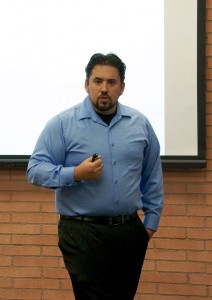Conversation centers on political opinions
Professor Michael Tesler from the University of California, Irvine presented a lecture, “Priming Predispositions and Changing Policy Positions,” to discuss how citizens change their minds regarding politics in the Von Kleinsmid Center on Monday morning. The event was hosted by the Department of Political Science as part of its visiting speaker series.

Primetime · UC Irvine Professor Michael Tesler discusses the role of priming in forming political opinions during a lecture on campus Monday. – Mariya Dondonyan | Daily Trojan
Tesler, whose specializations include public opinion and race politics, received his degrees at UCLA and also taught at Brown University. He is in the process of publishing a book titled Most-Racial: The Growing Racialization of Mass Politics in the Obama Era.
Tesler began his talk by defining the difference between the social effects of priming and opinion change with political communication to citizens.
“Priming [means] that the more attention mass communications pay to a particular aspect of political life, the more citizens use this to evaluate the candidates,” Tesler said.
Tesler gave the example of a citizen changing his or her candidate preference while keeping a predetermined view on a specific issue as an instance of priming.
“Opinion change is changing my views to match my candidate’s views,” Tesler said.
Tesler believes some people tend to maintain and strengthen these views over time.
“These two depend on how crystallized people’s opinions are at the time,” Tesler said. “By crystallized, I mean that these views are hardened over time and maintain a consistency throughout someone’s life.”
One phenomenon discussed was the American electorate’s lack of information about certain policy concerns. Tesler said that some citizens tend to rely on mass media communications for their political opinions.
“Most Americans lack well-developed positions about policies. Thus, they are heavily influenced by elite positions,” Tesler said.
Tesler’s research came from analyzing events in presidential politics.
“My research involved looking at new cases to see where information is either primed or an opinion change,” he said.
Tesler examined presidential politics in administrations ranging from Eisenhower’s to Obama’s. One of the cases he brought up was the impact of Obama becoming the first president to openly support gay marriage in 2012.
Tesler explained that this statement had a significant priming effect in changing public opinion to have a more favorable view of gay marriage.
Tesler noted, however, that this priming effect was short-lived.
“In two weeks’ time, the big priming effect that changed people’s opinion decays,” Tesler said. “Priming effects will disappear as new ideas become salient.”
Tesler concluded his lecture by explaining how his research can explain some forms of political communications.
“My priming hypothesis allows for political communications to affect the overall popularity of a candidate or issue,” Tesler said. “Political party-sponsored communication shapes some political attitudes, but it does not run roughshod over all of them.”
Tesler also talked about how citizens can impact politicians by formulating their own political opinions.
“Citizens can still hold politicians accountable if they take positions,” Tesler said.

